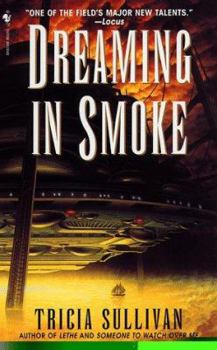Dreaming in Smoke
Select Format
Select Condition 
Book Overview
Kalypso Deed is a shotgun, riding the interface between the AI Ganesh and human scientists who solve problems through cyberassisted Dreams. But she's young and a little careless; she'd rather mix... This description may be from another edition of this product.
Format:Mass Market Paperback
Language:English
ISBN:0553577034
ISBN13:9780553577037
Release Date:May 1998
Publisher:Spectra Books
Length:401 Pages
Weight:0.50 lbs.
Dimensions:1.1" x 4.2" x 6.9"
Customer Reviews
3 ratings
Didn't understand all of it, but loved it
Published by Thriftbooks.com User , 16 years ago
The structure of this book was really neat: it opens with a minimum of exposition, instead dumping you right into an alien world and people doing procedural things that are unfamiliar. Before you can really get a handle on this, a crisis occurs! The backstory is revealed as the characters deal with the crisis. This is just a really neat way to tell a story. It DID make it hard to get into at first, but once I got going I really appreciated it and found it very compelling. This book doesn't have as much hard science as something like Cryptonomicon, but I understand why some people were turned off by the chemistry and math. Definitely some of that material went over my head, but I felt like it worked on multiple levels and that a complete understanding of the science wasn't necessary. It added to the richness though. It's hard to create an alien world, non-typical ways of living and non-typical societies. This book does all of those things and has the audacity to drop you right into them without a ton of prologue. I'm very much looking forward to reading more from this author.
Listen to the Music
Published by Thriftbooks.com User , 24 years ago
So there is a computer-like AI thing with an immersive VR interface. Does that automatically label the story cyberpunk? Most of it takes place outside the interface, while the data collected on the planet by the mediocre scientist Marcsson modify behavior of the AI in control of the colony's base, threatening the colony's existence. No one knows what's going on until the almost very end, and various factions create complications for each other, throwing around sabotage accusations. For the main character, Kalypso, it's all set to music. Or the lack of that. Picked on and abused by almost everyone, she holds the key to everyone's survival without knowing it.None of the characters are particularly likeable, as they all are viewed from the objective point, emphasizing their human vices and failures. Math is merely called by name, there's none of it there to buffle the reader. Biology is present more strongly, requiring some basic knowlege of what algae are, as they compose all the visible life on the mostly liquid planet.While some of the flow-of-conscience sequences aren't very interesting, the story in general is filled with overtones of psychedelic poetry. The AI functioning on the basis of Miles Davis's melodies alone is a wonderful idea, but there are also vivid paintings of the grim landscape, surreal encounters in both the reality and virtuality, and an implicit soundtrack detailed on the thank you list. Definitely a fresh non-standard work, and definitely worth reading. It may be called a classic one day. Don't forget to listen to the music!
Tricia Sullivan manages to delight again.
Published by Thriftbooks.com User , 26 years ago
The surreal imagery and lush poetry of Tricia Sulivan, combined with her tight plotting and mature philosophy, have captivated me. I had begun to despair for Science Fiction, but here is a lady with the ability to dazzle. "Dreaming in Smoke" has so many layers, and is so consistently good on them all, that I am not sure the average reader will be able to appreciate it. "Dreaming" has a more resolved ending than "Leith", her first book, and is less exhaustingly information dense than "Someone to Watch over Me". The best SF I have read this year.






